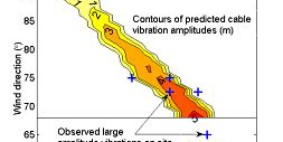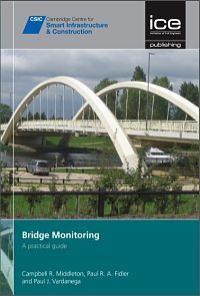Infrastructure research
The group has particular interest in:
- Long term dynamic performance of advanced composite bridge decks
- Structural vulnerability
- Wind loading and nonlinear dynamic performance of flexible structures
- Whole systems analysis of the Interdependence, vulnerability and resilience of network infrastructure.
Members of the group are also actively involved in the International Centre for Infrastructure Futures (ICIF). This is an interdisciplinary, practice-orientated research centre conducting fundamental research on infrastructure interdependency, policy, innovation, regulation, management and financing.
Bristol is also part of bin, a new national infrastructure research community.
Activities
Academic lead: Dr J Macdonald
 Pedestrian-induced vibrations of bridges, such as on the London Millennium Bridge, has the potential to cause significant fatigue damage to bridges. Analytical models backed up by experimental studies have been used to predict why this happens and what can be done to limit the vibrations. For further information please see the press articles on this research from The Times and BBC).
Pedestrian-induced vibrations of bridges, such as on the London Millennium Bridge, has the potential to cause significant fatigue damage to bridges. Analytical models backed up by experimental studies have been used to predict why this happens and what can be done to limit the vibrations. For further information please see the press articles on this research from The Times and BBC).
Academic lead: Dr J Macdonald
 Galloping and other aeroelastic mechanisms of fluid-structure interaction can cause large amplitude vibrations of cables on bridges, guyed masts wind turbines, etc. Flutter, vortex-induced vibrations and buffeting can be significant for long-span bridges. We are looking at these and other problems with the aim of finding ways to mitigate the vibrations through structural damping or changing the aerodynamic characteristics.
Galloping and other aeroelastic mechanisms of fluid-structure interaction can cause large amplitude vibrations of cables on bridges, guyed masts wind turbines, etc. Flutter, vortex-induced vibrations and buffeting can be significant for long-span bridges. We are looking at these and other problems with the aim of finding ways to mitigate the vibrations through structural damping or changing the aerodynamic characteristics.
Academic lead: Dr J Macdonald
 This research is looking at:
This research is looking at:
- Dynamic excitation mechanisms of cables, including aerodynamic mechanisms and from motion of the cable ends, including parametric excitation
- Nonlinear dynamic behaviour of cables
- Cable-deck and/or cable-tower interaction on bridges and other cable structures
- Dampers to suppress vibrations.
Academic lead: Dr P Vardanega
 The Structural Health Monitoring (SHM) revolution is presenting civil engineers with a data challenge. What parameters to measure? Where to measure these parameters? Why should these measurements be made? Smart systems require smart data. Work is ongoing with researchers at the Laing O’Rourke Centre for Construction Engineering & Technology and the Centre for Smart Infrastructure and Construction (both at the University of Cambridge) to develop a value rating methodology for assessing the value of SHM deployments on bridge structures.
The Structural Health Monitoring (SHM) revolution is presenting civil engineers with a data challenge. What parameters to measure? Where to measure these parameters? Why should these measurements be made? Smart systems require smart data. Work is ongoing with researchers at the Laing O’Rourke Centre for Construction Engineering & Technology and the Centre for Smart Infrastructure and Construction (both at the University of Cambridge) to develop a value rating methodology for assessing the value of SHM deployments on bridge structures.
This practical guide reviews the methodology for planning, designing and specifying monitoring systems with specific reference to bridge structures.
ICIF
The International Centre for Infrastructure Futures (ICIF) is an interdisciplinary, practice-orientated research centre conducting fundamental research on infrastructure interdependency, policy, innovation, regulation, management and financing. It was created to identify the combinations of actors, regulations and technologies that can provide for the effective planning, design, investment, construction, delivery and use of infrastructure services that underpin economic activity and improve citizens’ quality of life within modern societies.
ICIF brings together leading academics from six UK universities: University College London, Cranfield University and the universities of Bristol, Brighton, Sussex and Southampton. It aims to create a share learning environment in which social scientists, engineers, industrialists, policy makers and other stakeholders can research and learn together to understand how better to exploit the technical and market opportunities that emerge from the increased interdependence of infrastructure systems. ICIF-related research at the University of Bristol has resulted in the development of several innovative tools for infrastructure engineering, governance and policy. This work has focused on interdependency, smart city governance, resilience, learning and performance measurement.
A framework has been developed, in collaboration with UCL, for the identification, planning and management of interdependencies within and between infrastructure systems. This aids in minimising the unwanted risks associated with such interdependencies, as well as optimising the efficiency and resilience opportunities they also present. This framework has been adopted into HM Treasury’s Green Book Guidance. This work has also resulted in a holistic taxonomy of the many different forms that infrastructure interdependency can take. The rapid development and integration of connected technologies presents a large number of opportunities and challenges for the planning, governance and operation of traditional infrastructure systems. Through interviews and case studies a number of governance lessons from the city-wide implementation of smart technologies around the UK have been identified. Infrastructure systems present multiple complex challenges relating to issues such as climate change, food security, water security, poverty, natural hazards, energy, communication, transport, urban living, health, education and old-age. Making successful interventions to address these challenges requires resilience.
A novel model of resilience is emerging from the work of the ICIF at the University of Bristol focusing on how to be resilient. This outlines the capabilities and resources necessary to successfully addressing anticipated and unanticipated events. Crucially, it also looks at how these capabilities and resources can be acquired. Whether planning, managing, operating or using infrastructure, we embark on a tacit process of learning. In the service of a particular purpose we must identify, acquire and structure the necessary knowledge. This is particularly important in the context of achieving successful resilience in the face of rapidly changing environments; following a natural disaster for example. The ICIF group at the University of Bristol has looked at the formalisation of these learning journeys in order to increase the speed and efficacy with which they take place. The increasingly connected nature of infrastructure, together with the changing social demands placed upon it, has presented the need for improved methods of performance monitoring. A process for developing outcome-oriented performance metrics for the whole infrastructure system has been developed in collaboration with the iBUILD project.
ICIF is jointly funded by both the Engineering and Physical Sciences Research Council and the Economic and Social Research Council (Grant reference: EP/K012347/1).
